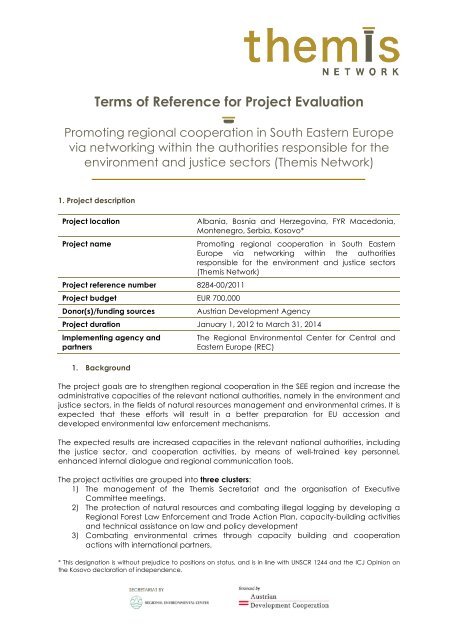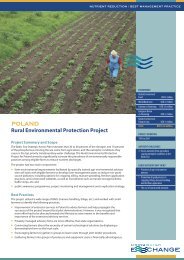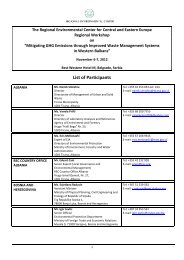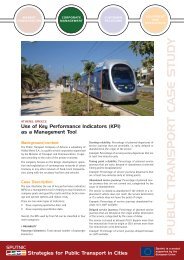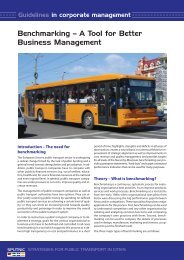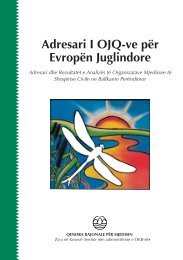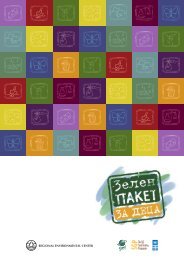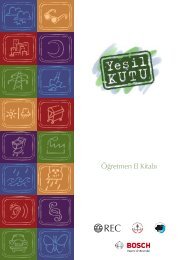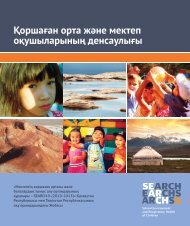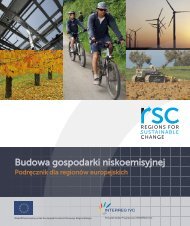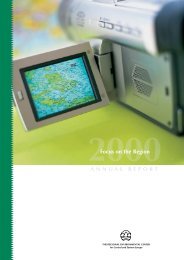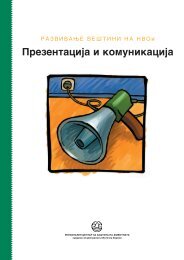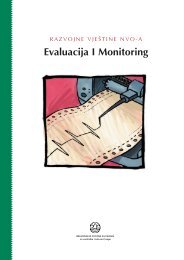Terms of Reference - The Regional Environmental Center for ...
Terms of Reference - The Regional Environmental Center for ...
Terms of Reference - The Regional Environmental Center for ...
Create successful ePaper yourself
Turn your PDF publications into a flip-book with our unique Google optimized e-Paper software.
<strong>Terms</strong> <strong>of</strong> <strong>Reference</strong> <strong>for</strong> Project EvaluationPromoting regional cooperation in South Eastern Europevia networking within the authorities responsible <strong>for</strong> theenvironment and justice sectors (<strong>The</strong>mis Network)1. Project descriptionProject locationProject nameProject reference number 8284-00/2011Project budget EUR 700,000Donor(s)/funding sourcesAlbania, Bosnia and Herzegovina, FYR Macedonia,Montenegro, Serbia, Kosovo*Promoting regional cooperation in South EasternEurope via networking within the authoritiesresponsible <strong>for</strong> the environment and justice sectors(<strong>The</strong>mis Network)Austrian Development AgencyProject duration January 1, 2012 to March 31, 2014lmplementing agency andpartners1. Background<strong>The</strong> <strong>Regional</strong> <strong>Environmental</strong> <strong>Center</strong> <strong>for</strong> Central andEastern Europe (REC)<strong>The</strong> project goals are to strengthen regional cooperation in the SEE region and increase theadministrative capacities <strong>of</strong> the relevant national authorities, namely in the environment andjustice sectors, in the fields <strong>of</strong> natural resources management and environmental crimes. It isexpected that these ef<strong>for</strong>ts will result in a better preparation <strong>for</strong> EU accession anddeveloped environmental law en<strong>for</strong>cement mechanisms.<strong>The</strong> expected results are increased capacities in the relevant national authorities, includingthe justice sector, and cooperation activities, by means <strong>of</strong> well-trained key personnel,enhanced internal dialogue and regional communication tools.<strong>The</strong> project activities are grouped into three clusters:1) <strong>The</strong> management <strong>of</strong> the <strong>The</strong>mis Secretariat and the organisation <strong>of</strong> ExecutiveCommittee meetings.2) <strong>The</strong> protection <strong>of</strong> natural resources and combating illegal logging by developing a<strong>Regional</strong> Forest Law En<strong>for</strong>cement and Trade Action Plan, capacity-building activitiesand technical assistance on law and policy development3) Combating environmental crimes through capacity building and cooperationactions with international partners.* This designation is without prejudice to positions on status, and is in line with UNSCR 1244 and the ICJ Opinion onthe Kosovo declaration <strong>of</strong> independence.
This project targets 120 people trained and involved in the activities directly, with a spillovereffect to another 430 as a minimum. <strong>The</strong> target groups are policy makers and legislators fromministries <strong>of</strong> justice and environment, judges and prosecutors, and practitioners from theen<strong>for</strong>cement agencies attached to the ministries <strong>of</strong> environment, <strong>for</strong>estry, and the interior.<strong>The</strong> <strong>Regional</strong> <strong>Environmental</strong> <strong>Center</strong> (REC) is implementing the project, as the secretariat <strong>for</strong>the <strong>The</strong>mis cooperation plat<strong>for</strong>m, with the help <strong>of</strong> its country <strong>of</strong>fice network in thebeneficiary region.2. Purpose <strong>of</strong> the evaluation<strong>The</strong> evaluation is intended to assess the relevance, per<strong>for</strong>mance, managementarrangements and successes and failures <strong>of</strong> the project, based on the benchmarks andindicators identified during the planning stage.<strong>The</strong> evaluation will, in particular:• seek to enhance the project impact by examining lessons learned <strong>for</strong> a possible newphase <strong>of</strong> the project;• provide accountability to the donor by determining whether the project objectiveswere met and resources were wisely utilised;• identify areas <strong>of</strong> improvement in the project;• clarify and tackle problems; and• obtain participatory feedback from the major stakeholders involved in the project.<strong>The</strong> evaluation will also:• provide suggestions on setting different priorities and goals;• provide suggestions on new strategic directions <strong>for</strong> the future; and• provide recommendations on the methodology, planning and implementation <strong>of</strong>similar projects in the future, always keeping in mind that the final objective would beto contribute to the development <strong>of</strong> environmental protection in the beneficiaryregion.<strong>The</strong> main users <strong>of</strong> the evaluation will be the project management team, the donor and thebeneficiary countries.3. Objectives<strong>The</strong> evaluation is commissioned by the REC, as implementing partner, following the rules <strong>of</strong>the donor (ADA) <strong>for</strong> accountability and quality assurance. <strong>The</strong> exercise is carried out in thefinal months <strong>of</strong> project implementation to assess the adequacy <strong>of</strong> the proposed instrumentsand the results achieved.<strong>The</strong> evaluation aims to review the results (outputs, outcomes, impacts) and assess theeffectiveness, efficiency and relevance <strong>of</strong> interventions with a view to providing conclusionsand recommendations.4. Subject and focus (scope)Unit <strong>of</strong> analysis and time period:<strong>The</strong> evaluation covers activities per<strong>for</strong>med under the project “Promoting regionalcooperation in South Eastern Europe via networking within the authorities responsible <strong>for</strong> theenvironment and justice sectors (<strong>The</strong>mis Network)”, Contract n° 8284-00/2011 <strong>for</strong> the period2012-2013.Financed by Austrian Development CooperationPage 2 <strong>of</strong> 8
Interventions covered and target groups:<strong>The</strong> evaluation will analyse the activities carried out under the three clusters <strong>of</strong> the projectand the accomplishment <strong>of</strong> the expected results, in particular <strong>for</strong> the capacity-buildingactivities and cooperation actions, as well as the overall running <strong>of</strong> the activities (projectmanagement, communication). It will also cover the project benefits <strong>for</strong> the target groupstogether with the eventual weaknesses in their targeting and needs assessment.Geographical scope:<strong>The</strong> evaluation will be executed at regional level, as the project followed a regionalapproach. However, national-level benefits and impacts are to be identified <strong>for</strong> thebeneficiary countries whenever possible.Funds <strong>for</strong> interventions:<strong>The</strong> evaluation will provide an analysis <strong>of</strong> the overall adequacy <strong>of</strong> funds and <strong>of</strong> whether theresources were wisely utilised, without prejudice to the financial audit <strong>of</strong> expenditures that isregularly carried out <strong>for</strong> the financial reporting.Cross-cutting issues:<strong>The</strong> addressing <strong>of</strong> gender equality and anti-corruption transparency measures will be takeninto consideration in the analysis <strong>of</strong> the results. In particular, it will be checked whether thegender considerations integrated in the project document (e.g. gender disaggregation inthe purpose indicators) have been addressed.Logframe analysis:<strong>The</strong> intervention logic will be analysed.Other parameters:<strong>The</strong> participation <strong>of</strong> the beneficiary countries and country ownership will be assessed,together with coordination issues and communication (internal/external) by the projectmanagement team.<strong>The</strong> evaluation will rely on the five OECD DAC evaluation criteria (relevance, efficiency,effectiveness, impact and sustainability) and the criteria <strong>of</strong> partnerships and cooperation.<strong>The</strong> evaluators shall follow all the guidelines provided in the publication “Guidelines <strong>for</strong>Project and Programme Evaluations”, available on the Austrian Development Cooperationwebsite.5. Main evaluation questions1) Relevance• How relevant is the project and its activities to the development and trans<strong>for</strong>mation<strong>of</strong> the beneficiary region?• How relevant is the project in the process <strong>of</strong> EU law implementation anden<strong>for</strong>cement in the field <strong>of</strong> environment (natural resources, <strong>for</strong>estry, environmentalcrimes prevention and prosecution)?• How relevant is the project to the beneficiary countries’ needs and priorities/strategic goals in the field <strong>of</strong> environmental law implementation and the EUaccession process?• How important is the significance <strong>of</strong> the interventions regarding the target groups’needs (including women) and the strengthening <strong>of</strong> national authorities <strong>for</strong> bettercompliance?• How relevant are the actions to the intervention logic set at the project designphase?Financed by Austrian Development CooperationPage 3 <strong>of</strong> 8
• To what extent does the project comply with ADA’s strategic goals <strong>for</strong> thebeneficiary region?2) Efficiency• Were the resources and inputs (man-days and budget) converted to outputs in atimely and effective manner?• Were the capacities used in a reasonable way?• What is the cost/benefit ratio? Were the initial resources proportional to the outcomes(i.e. was the project efficient overall)?• Was the monitoring <strong>of</strong> the implementation adequate from the project managementside?• Was cooperation from the side <strong>of</strong> the financial support recipients adequate(beneficiary countries/institutions)?• What was the effectiveness or impact <strong>of</strong> the project activities compared to theobjectives planned?3) Effectiveness• Were the planned objectives and outcomes contained in the project documentachieved? Were these objectives realistic?• Have the project activities contributed to sustainable capacity building in thebeneficiary countries?• What factors were crucial <strong>for</strong> the achievement <strong>of</strong>/failure to achieve the projectobjectives?• What other factors can be observed regarding the achievement <strong>of</strong> the projectobjectives?• Was the outreach <strong>of</strong> activities towards beneficiaries adequate (trained personnel)?• Were materials developed and prepared? What was the quality?• Were the planned cooperation actions with partners carried out? Were newpartnerships <strong>for</strong>med or existing ones strengthened?• Were the planned guidelines/publications produced? Were they adequate to thecountries’ needs?• Were the horizontal cross-cutting issues addressed?• If the planned outcomes were not achieved, what measures can be suggested tothe project management?• Were internal and external communication tools properly used to reach a widetarget audience?4) Impact• To what extent were the overall objective and project goals realistic?• Did the interventions contribute to reaching a higher level than the objectives set atthe project design phase?• What is the impact or effect <strong>of</strong> the interventions in proportion to the overall situation<strong>of</strong> the target group, also including gender issues?• Has the project contributed, or is it likely to contribute, to long-term social, economicand technical changes <strong>for</strong> the countries, individuals and institutions benefiting fromthe project?• What is the status <strong>of</strong> project ownership in the beneficiary countries? Did it increaseduring the project?5) Sustainability• Are the positive effects or impacts sustainable?• How is the sustainability or permanence <strong>of</strong> the intervention and its effects to beassessed?Financed by Austrian Development CooperationPage 4 <strong>of</strong> 8
• To what extent are the project results likely to continue after the project?• What risks/potentials can be detected as regards the sustainability <strong>of</strong> project results?• Will the beneficiary countries contribute in some <strong>for</strong>m to the sustainability <strong>of</strong> theproject processes and results?• To what extent was the intervention exemplary? To what extent did it create lastingstructures and mechanisms? 6) Partnerships and cooperation• To what extent have sustainable partnerships been sought and established andsynergies created in the delivery <strong>of</strong> assistance?• How have regional cooperation and partnerships between the countries developedduring the project implementation and beyond?6. Evaluation approach and methods<strong>The</strong> evaluation will be carried out by external evaluator(s) in line with the OECD DACEvaluation Quality Standards and following the ADC “Project and Programme Evaluation”guidelines and international standards.<strong>The</strong> evaluator(s) are expected to elaborate an inception report and a final evaluation reportresulting from desk research based on the available project documents and from bilateralinterviews with the project beneficiaries.<strong>The</strong> following evaluation phases are envisaged:1) <strong>The</strong> evaluator(s) will be requested to commence the assessment with deskresearch, by screening the project documents and the implementation files(reports, monitoring indicator tables, evaluations <strong>of</strong> the training activities, contactlists <strong>for</strong> the beneficiary countries). A meeting might be organised to debrief theevaluators.2) Based on the in<strong>for</strong>mation collected, a draft inception report will be prepared,which will be discussed with the project team with a view to receivingcomments/clarification requests. For the report, preliminary data will be analysedalso taking into account horizontal issues (e.g. gender, anti-corruption,transparency), and a final methodology will be agreed upon. <strong>The</strong> evaluators willproduce the inception report in compliance with the <strong>for</strong>mat available as anannex in the ADC Guidelines <strong>for</strong> Project and Programme Evaluation.3) <strong>The</strong> evaluator(s) will then conduct definitive in<strong>for</strong>mation and data gathering,through whatever means approved in the inception report, and will take care toinclude the opinions <strong>of</strong> the beneficiary countries’ representatives, project team,partners, and any other stakeholders involved in their assessment. <strong>The</strong> datacollection will be followed by final data analysis and the drafting <strong>of</strong> theevaluation report.4) <strong>The</strong> draft final report will be sent to the project team, project beneficiaries andADA <strong>for</strong> quality control and comments. Once the comments have been taken onboard the report will be finalised and made available to the project stakeholders.<strong>The</strong> total number <strong>of</strong> days dedicated to the task should be 15 working days, including on-thespotvisits, if applicable, with a maximum duration <strong>of</strong> four days.Financed by Austrian Development CooperationPage 5 <strong>of</strong> 8
7. TimetableActivities Timeline: Deadline Chargeable workdays0. Tender acceptance October 10, 2013 NA1. Desk research, screening <strong>of</strong> projectdocumentsOctober 20, 2013Financed by Austrian Development Cooperation2 daysInception report October 25, 2013 3 days2. Gathering and analysingin<strong>for</strong>mation in preparation <strong>for</strong> thefinal report3. Draft final report completed andsent <strong>for</strong> comments and qualitycontrol4. Final report, with commentsaddressed, and publicdissemination8. Evaluator’s team and qualificationsNovember 10, 2013November 15, 2013December 15, 20135 days2 days3 daysMain qualifications required from evaluator(s):• Pr<strong>of</strong>ound knowledge and experience in environmental governance, lawen<strong>for</strong>cement and EU environmental law.• Experience with the EU accession and law harmonisation process.• Understanding <strong>of</strong> public sector challenges and opportunities, with a view toinstitution development.• Knowledge <strong>of</strong> the specificities <strong>of</strong> the beneficiary countries and the dynamics <strong>of</strong>political, economic, social transition, in particular linked to the environmentalsector.• Proven experience in project management and evaluation. Internationalexperience within the United Nations system/EU policies will be considered anasset.• Previous experience in South Eastern Europe and <strong>of</strong> capacity-building projects.• Cross-sector and gender expertise.• Excellent drafting skills.• Fluency in English required. Knowledge <strong>of</strong> the national language(s) <strong>of</strong> thebeneficiary countries will be considered an asset.Candidate(s) must submit to the REC an application package containing a technical <strong>of</strong>ferand a financial <strong>of</strong>fer in two separate sealed envelopes, together with an electronic copy <strong>of</strong>the documents on a CD. <strong>The</strong> technical <strong>of</strong>fer must include a cover letter <strong>of</strong> a maximum <strong>of</strong>two pages presenting the evaluator/team and illustrating the evaluator’s/team members’capacities, relevant experiences and qualifications <strong>for</strong> the envisaged tasks. For teamcandidates, it must be clearly visible from the <strong>of</strong>fer which <strong>of</strong> the proposed evaluators will actas team leader. <strong>The</strong> cover letter should be accompanied by supporting documents (CVs,references, relevant certificates). <strong>The</strong> financial <strong>of</strong>fer must be submitted in a separateenvelope as the two will be assessed independently.In order <strong>for</strong> <strong>of</strong>fers to be assessed not only according to the aspect <strong>of</strong> costs, the technical<strong>of</strong>fers will be assessed first by the project team at the REC, based on a pre-definedevaluation grid. <strong>The</strong> assessment team will comprise the REC staff members responsible <strong>for</strong>Page 6 <strong>of</strong> 8
project implementation (maximum four people), the project director and one representativefrom the REC’s Finance Department. <strong>The</strong> best value <strong>for</strong> money <strong>of</strong>fer will be selected.<strong>The</strong> deadline <strong>for</strong> the submission <strong>of</strong> applications is 14:00 CET on August 30, 2013.Offers must be sent by post to:ATTN: Aniko Nemeth/ Bruno Mesquita<strong>Regional</strong> <strong>Environmental</strong> <strong>Center</strong>Ady Endre ut 9-112000 Szentendre, Hungary9. Reports<strong>The</strong> output <strong>of</strong> this task will be an evaluation report in English. <strong>The</strong> maximum length <strong>of</strong> thereport is 40 pages with annexes. As preparation <strong>for</strong> the evaluation task and final report, it isalso expected that the evaluator(s) will produce an inception report following the <strong>for</strong>matdefined in the ADC Guidelines <strong>for</strong> Project and Programme Evaluation.<strong>The</strong> structure and content <strong>of</strong> the final report should meet the requirements <strong>of</strong> the ADC“Project and Programme Evaluation” guidelines and other international standards. <strong>The</strong> finaldraft evaluation report and final report must be structured according to the OECD/DACcriteria and the evaluation questions.<strong>The</strong> evaluation report must:• contain an executive summary (mandatory);• be analytical in nature (both quantitative and qualitative);• be structured around issues and related findings/lessons learnt;• include conclusions; and• include recommendations<strong>The</strong> evaluation report will be assessed against the evaluation quality criteria <strong>of</strong> theOECD/DAC. In addition, the final report should:• comply with these terms <strong>of</strong> reference;• include a separate analysis <strong>of</strong> the cross-cutting issues;• include a description and assessment <strong>of</strong> the intervention logic;• base any conclusions and recommendations on clearly stated findings;• include a clear methodology section (previously defined and agreed in theinception report) explaining how in<strong>for</strong>mation was gathered, processed andanalysed;• be realistic about the lessons learnt and other recommendations, which should beclearly addressed to concrete stakeholders, partners, etc.;• contain a list <strong>of</strong> consulted stakeholders; and• contain a bibliography detailing all documents used, but highlighting the mostimportant. Financed by Austrian Development CooperationPage 7 <strong>of</strong> 8
10. Coordination and responsibility<strong>The</strong> evaluator(s) shall be duly responsible <strong>for</strong> fulfilling the tasks described. <strong>The</strong> REC will providesupervision and logistical support <strong>for</strong> the desk research, by making the relevant projectdocuments available, and <strong>for</strong> setting up interviews on the spot, if applicable.11. AnnexesProgramme details.Please consult the project website http://themis.rec.org/. Most documentation aboutproject activities is posted on this site. More detailed in<strong>for</strong>mation, or in<strong>for</strong>mation not disclosedto the public, will be made available to the selected team <strong>of</strong> evaluators.Financed by Austrian Development CooperationPage 8 <strong>of</strong> 8


